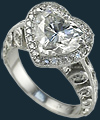Diamond Education
The Four C's Of Diamond Quality
Carat - Clarity - Color - Cut
The Diamond Quality Pyramid is a framework to help you compare
diamonds. While all diamonds are precious, those closest to the top of
the pyramid - possessing the best combination of cut, clarity, carat
weight and color - are the earth's rarest, most valuable and most
beautiful to the eye.
Carat
The Larger a Diamond, the Rarer
Larger diamonds are found relatively infrequently in nature, which
places them at the rarest level of the Diamond Quality Pyramid. What
also makes a bigger diamond so desirable is that it shows off a stone's
line color and cut, and therefore its brilliance, to its best advantage.
A diamond's size is measured in carat weight, and each carat is equal to
200 milligrams and is divided into 100 points . A .75 carat diamond is
the same as a 75-point diamond or a 3/4 carat stone.
While larger diamonds are highly prized, diamonds of equal size may
vary widely in value and brilliance, depending on their qualities of
clarity, cut, and color.
Clarity
The Purer a Diamond ihe More Brilliant
The greater a diamond's clarity, the more brilliant, valuable and rare it
is — and the higher it is on the Diamond Quality Pyramid.
Virtually all natural diamonds contain identifying characteristics, yet
many are invisible to the naked eye. Under the scrutiny of a jeweler's
1Ox-magnifying loupe or microscope, natural phenomena — called
inclusions — may be seen. These are nature's birthmarks, and they may
look like tiny crystals, clouds, or feathers.
Diamonds categorized as internally flawless reveal no such inclusions.
Flawless stones are at the peak of the Diamond Quality Pyramid and
are treasured for their rarity and beauty. Diamonds with very, very
small inclusions are graded as VVS1 or VVS2. The larger the
inclusion, the lower the grade and the less rare the diamond. Inclusions
that can be seen with the naked eye are graded II or 13.
The number, color, type, size and position of surface and internal
birthmarks affect a diamond's value. Major inclusions can interfere
with the path of light that travels through a diamond, diminishing its
brilliance and sparkle and therefore its value.
Color
The Purer the Color the Rarer the Diamond
Diamonds are graded by color, starting at D and continuing through the
alphabet. Truly colorless stones, graded D, treasured for their rarity and
value, are highest on the Diamond Quality Pyramid.
While many diamonds appear colorless, they may actually have subtle
yellow or brown tones and these color grades include P and Q.
Although still beautiful, they will be less rare and therefore less
valuable. To appreciate the simple beauty of each individual stone, you
should compare diamonds side by side at a jeweler or diamond dealer's
office.
"Fancy" diamonds — in well defined colors that include red, pink, blue,
green and canary yellow — are highly prized and particularly rare.
Cut
The Better Cut a Diamond, the More Brilliant
A well cut or faceted diamond, regardless of its shape, scintillates with
fire and light - offering the greatest brilliance and value.
While nature determines a diamond's clarity, carat weight and color,
me hand of a master craftsman is necessary to release its fire, sparkle
and beauty. When a diamond is cut to good proportions, light will
reflect from one mirror-like facet to another and disperse through the
top of the stone, resulting in a display of brilliance and fire.
Diamonds that are cut too deep or loo shallow lose light: it spills
through the side or bottom. As a result, poorly cut stones will be less
brilliant and beautiful - and certainly less valuable - than well cut
diamonds higher on the Diamond Quality Pyramid.
When it comes to diamond jewelry, such as Diamond Solitaire Stud
Earrings, purchase the diamond that captures the brilliance of the
moment. Choosing a quality diamond to celebrate life's most intimate
occasions is a truly rewarding experience for the one who gives as well
as for the one who receives.












